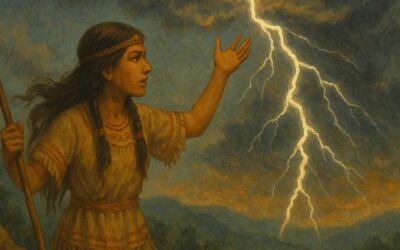The Gist
Who Was Balder?
Balder, known as the god of light, joy, and purity, was the son of Odin, the All-Father, and Frigg, the goddess of love and marriage. He was adored not only by his parents but by all the gods in Asgard. His presence symbolized peace and harmony, and many saw him as a figure of perfection. However, even in the world of gods, no one is immune to fate. Balder’s fate was sealed by a disturbing dream he had—one that foretold his own death.
The Prophecy of Balder’s Death
When Balder began having dreams about his death, the gods grew anxious. Frigg, desperate to protect her son, traveled across the Nine Realms, asking every creature, plant, and object to swear they would never harm Balder. Everything she encountered took the oath, and it seemed as if Balder would be safe from harm. However, in her efforts to shield him, Frigg overlooked one seemingly insignificant thing—a small sprig of mistletoe. She thought it was too harmless to pose a threat, and so, it was the only thing in the world that didn’t promise not to hurt Balder.
Loki’s Trickery
Enter Loki, the trickster god, known for causing mischief and chaos. Loki, jealous of Balder’s beauty and popularity, devised a plan to exploit the one vulnerability in Frigg’s otherwise perfect protection. Disguising himself as an old woman, Loki tricked Frigg into revealing that mistletoe was the only thing that hadn’t taken the oath. Armed with this knowledge, Loki crafted a small spear made from the mistletoe plant.
During a celebration in Asgard, the gods were testing Balder’s invulnerability by throwing weapons and objects at him, knowing that nothing could harm him. But Loki handed the mistletoe spear to Balder’s blind brother, Hodr, encouraging him to join the fun. Unaware of the spear’s deadly potential, Hodr threw it at Balder. The mistletoe pierced his heart, and to everyone’s horror, the beloved Balder fell dead.
The Aftermath of Balder’s Death
Balder’s death sent shockwaves through Asgard. The gods were devastated, and Odin, in particular, was filled with grief. They tried to bargain with Hel, the goddess of the underworld, to release Balder from the realm of the dead. Hel agreed, but only on one condition—every creature in the universe had to mourn Balder’s death. The gods thought this task would be easy, as Balder was loved by all.
However, Loki once again interfered. He disguised himself as a giantess named Thokk, who refused to mourn Balder. With this act of defiance, Hel’s condition was not met, and Balder remained in the underworld. His death marked the beginning of the end for the gods, as it was a key event leading up to Ragnarok, the final battle in Norse mythology.
The Symbolism of Balder’s Death
The story of Balder’s death is more than just a tragic tale. It reflects deeper themes of inevitability, fate, and betrayal. No matter how hard the gods tried to prevent his death, they couldn’t escape what was foretold. It also serves as a reminder of how even small, overlooked things—like a sprig of mistletoe—can have monumental consequences. And then there’s the role of Loki, whose actions highlight how jealousy and mischief can unravel even the most harmonious worlds.
The Tragic Beauty of Balder’s Story
Balder’s death is a powerful reminder that even the brightest lights can be extinguished. It’s a story of love, betrayal, and the inevitability of change—lessons that feel as relevant today as they did in ancient mythology. His death was a turning point, not just for the gods but for the entire cosmos, showing us that even in times of peace, darkness can find a way in.
Let’s Talk
The death of Balder is such a fascinating story, isn’t it? On the surface, it’s a myth about gods, mistletoe, and trickery, but the more you think about it, the more layers it seems to have. I mean, how wild is it that something as seemingly harmless as mistletoe could cause the downfall of one of the most beloved gods? It makes you wonder—how often do we overlook the small things in our lives, assuming they’re too insignificant to make a difference, only to have them come back in unexpected ways?
There’s also something so relatable about the way the gods tried to protect Balder from harm. It’s kind of like when parents try to shield their kids from every possible danger, only to realize that life has a way of slipping through the cracks no matter how hard you try. Frigg’s decision to skip over mistletoe is a perfect example of how even the best-laid plans can go awry. It’s a bit comforting, in a way—if even the gods couldn’t prevent every bad thing from happening, maybe we shouldn’t be so hard on ourselves when things don’t go according to plan.
And then there’s Loki. What’s interesting about Loki in this story is that he doesn’t just cause chaos for the sake of it—there’s a deeper sense of jealousy and resentment underneath his actions. Have you ever been in a situation where someone just couldn’t stand to see someone else succeed or be happy? It’s such a human thing, isn’t it? Loki’s actions remind us that jealousy can fester in the unlikeliest places, and if we’re not careful, it can drive us to do things we wouldn’t normally consider.
But what really gets me is how this story ties into the idea of fate. No matter what the gods did to try and change Balder’s destiny, it still played out exactly as it was foretold. That’s one of the things I love most about mythology—how it captures the tension between free will and inevitability. It makes you think: how much control do we really have over the events in our lives? Are there moments when no amount of planning or preparation can change what’s meant to happen? It’s a bit unsettling, but also kind of freeing in a way. Maybe it means we can let go of the pressure to get everything right and just focus on doing the best we can.
The story of Balder’s death also reminds me of how much weight we put on endings. Think about it—if a relationship ends badly, it can overshadow all the good times that came before. That’s exactly what happened with Balder’s death. Even though he was a source of light and joy for so long, the way things ended left a mark on everyone involved. It’s a reminder that how we handle endings—whether in relationships, jobs, or even small daily experiences—matters more than we realize.
So, what do you think? Do you see bits of Balder’s story in your own life, maybe in the way small things sometimes have big consequences? Or have you ever experienced a situation where no matter how hard you tried to change the outcome, things still played out the way they were meant to? It’s worth thinking about, because mythology may be ancient, but the themes it explores are still just as relevant today.
Let’s Learn Vocabulary in Context
Let’s explore some of the key vocabulary from Balder’s story and how these words and phrases can show up in our daily lives. First, there’s prophecy. In the context of Balder’s death, the prophecy was a forewarning of his inevitable fate. A prophecy doesn’t just mean predicting the future—it often carries a sense of destiny, something you can’t escape. In real life, we might use the word more loosely. Have you ever said, “I knew this was going to happen!” when things didn’t go your way? That’s you leaning into your own little prophecy. It’s those moments when life seems to be following a script you didn’t write.
Now, let’s talk about betrayal. This one’s heavy, right? In the myth, Loki’s trickery wasn’t just mischief—it was a betrayal of trust, especially since the gods considered him one of their own. Betrayal isn’t always as dramatic as in myths. Sometimes it’s a small letdown, like when a friend cancels on plans last minute. But no matter the size, betrayal stings because it’s about someone breaking trust, whether intentionally or not.
Then there’s vulnerability. The idea that Balder could be so well protected, except for one tiny vulnerability—a sprig of mistletoe—makes the story even more tragic. We all have vulnerabilities, whether we show them or not. It might be an emotional weakness, like needing approval, or something practical, like always losing your keys. The lesson here? Even the smallest vulnerabilities can have a bigger impact than we think.
Inevitability plays a huge role in this story too. No matter what the gods did to protect Balder, his death was inevitable. This word captures the feeling that something is bound to happen, whether you like it or not. It’s like that feeling you get when you see the sky darken, and you just know it’s going to rain—even if you don’t have an umbrella. There’s a certain peace in accepting inevitability sometimes, isn’t there? It’s about recognizing what you can’t control.
And let’s not forget reconciliation. The gods tried to reconcile Balder’s death by bargaining with Hel, hoping to bring him back from the underworld. Reconciliation in everyday life is about making peace—whether that’s patching things up with a friend after an argument or finding closure after a tough experience. It’s not always easy, but it’s an important part of moving forward.
So here are some questions to consider: Have you ever experienced a betrayal, big or small, and how did you handle it? And what’s a vulnerability of yours—something small, like Balder’s mistletoe, that sometimes catches you off guard? These concepts might come from mythology, but they play out in real life more often than we realize.










0 Comments